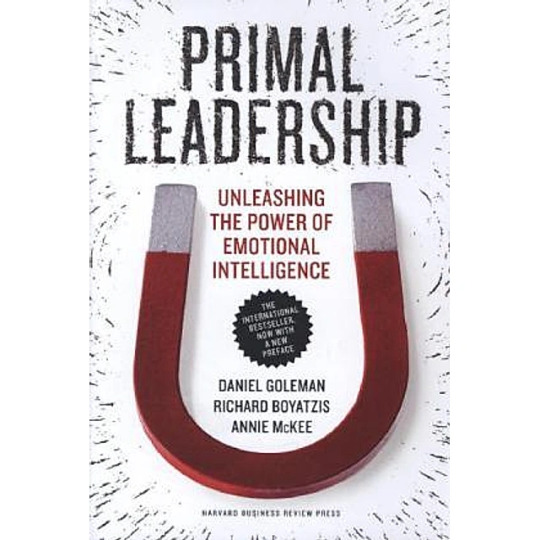#emotional intelligence daniel goleman
Explore tagged Tumblr posts
Text
Book of the Day - Primal Leadership
Today’s Book of the Day is Primal Leadership, Unleashing the Power of Emotional Intelligence written by Daniel Goleman, Richard E. Boyatzis, and Annie McKee in 2016 and published by Harvard Business Review Press. Daniel Goleman is an author, psychologist, and science journalist, author of many publications and books about Emotional Intelligence, a term he immensely contributed to gain popularity…

View On WordPress
#Book#book recommendation#book review#bookstagram#booktok#Daniel Goleman#Emotional Intelligence#Harvard Business Review Press#leadership#Primal Leadership#Raffaello Palandri#Richard E. Boyatzis
9 notes
·
View notes
Text

source
#daniel goleman#emotional intelligence#EQ#mastery#self mastery#personality#character#mental health#mental capacities#meta#meta-ability#heart#mind#feeling#thinking#balance#harmony#intelligence#wisdom#maturity
1 note
·
View note
Text
''‘There is perhaps no psychological skill more fundamental than resisting impulse’, writes Daniel Goleman in Emotional Intelligence (1995), one of the many books to cite these famous experiments. ‘It is the root of all self-control, since all emotions, by their very nature, lead to one or another impulse to act.’ Delayed or deferred gratification is, therefore, a key trait in productive competence. Those lacking willpower or selfcontrol will seek instant gratification, states Goleman, whether through sought pleasure or avoided pain. While those with self-control will ignore short-term inconveniences and temptations in order to focus on future potential rewards.''
-Robert Kelsey, Get Things Done
0 notes
Text
#emotional intelligence#what is emotional intelligence#intelligence#emotions#emotional intelligence summary#how to improve emotional intelligence#daniel goleman emotional intelligence#emotional intelligence in the workplace#how to be emotionally intelligent#emotional intelligence 2.0#how to master your emotions emotional intelligence#high emotional intelligence#emotional#define emotional intelligence#emotional intelligence at work#improve emotional intelligence
0 notes
Text
Emotional Intelligence
Emotional intelligence, as described by Daniel Goleman, encompasses self-awareness, self-management, self-motivation, social awareness, and relationship management. Developing empathy is a crucial step towards enhancing emotional intelligence.
On Emotional Intelligence by Daniel Goleman published in two thousand five: What is emotional intelligence? How does EI develop? When and where do people practice EI? Daniel Goleman is a psychologist and science journalist who writes in-depth about self-awareness, self-management, self-motivation, social awareness, and relationship management. Those five things are what Goleman is referring to…
#amherst#daniel#downregulate#emotional#emotions#empathy#EQ#friendship#goleman#harvard#intelligence#IQ#isolation#journalist#meditation#mindfulness#new#nonfiction#psychology#quotient#redefine#regulation#relationship#relationships#self-control#smart#social#socialization#times#writer
0 notes
Text
"The prefrontal cortex can refine or put the brakes on the amygdala's impulse to rampage, but cannot keep it from reacting in the first place. Thus while we cannot decide when we have our emotional outbursts, we have more control over how long they last. . . . Over the course of therapy, what seems to change in the main are the responses that people make once an emotional reaction is triggered-but the tendency for the reaction to be triggered in the first place does not dissappear entirely."
- Emotional Intelligence by Daniel Goleman (2020)
And one more from the end of the chapter...
"In short, emotional lessons-even the most deeply implanted habits of the heart learned in childhood-can be shaped. Emotional learning is lifelong."
0 notes
Text
Done. The first of the year. I had a hard time going through the sections that went too deep in the brains functioning, too scientific to my taste. But, in general, this book helped me to reinforce the importance of knowing how to handle our emotions. Also, the book says that anxiety is not necessarily something you develop in the course of your life, but something you may born with.

0 notes
Text
🤲 Si. 🌱
“Attualmente, l'educazione emozionale dei nostri figli è lasciata al caso, con risultati sempre più disastrosi. La soluzione sta in un nuovo modo di considerare ciò che la scuola può fare per educare l'individuo come persona - ossia mettendo insieme mente e cuore.[…] Prevedo un giorno nel quale sarà compito normale dell'educazione quello di inculcare comportamenti umani essenziali come l'autoconsapevolezza, l'autocontrollo e l'empatia, e anche l'arte di ascoltare, di risolvere i conflitti e di cooperare.”
— Intelligenza emotiva, Daniel Goleman
16 notes
·
View notes
Text
Book of the Day - Why We Meditate
Today’s Book of the Day is Why We Meditate, written by Daniel Goleman and Tsoknyi Rinpoche in 2022 and published by Penguin Books. Daniel Goleman is one of the most relevant authors, psychologists, and science journalists of our age, having introduced the concept of Emotional Intelligence to the world in 1995. He was a science reporter for The New York Times, was twice nominated for the Pulitzer…

View On WordPress
#Book#book recommendation#book review#bookstagram#booktok#Buddhism#Buddhist Master#Business#clarity#compassion#Daniel Goleman#healing#meditation#mindfulness#Raffaello Palandri#self improvement#Tsoknyi Rinpoche#Why We Meditate
41 notes
·
View notes
Text


Recently started reading Emotional Intelligence by Daniel Goleman. I'm only 8% through but it's been a nice bedtime read so far!
4 notes
·
View notes
Text
cool article. I personally use the phrase “emotional intelligence” in a totally different way in my personal life but this is basically exactly how I feel about the concept of resilience. and weird to learn that this is where the phrase came from
1 note
·
View note
Text
Anybody can become angry - that is easy, but to be angry with the right person and to the right degree and at the right time and for the right purpose, and in the right way - that is not within everybody's power and is not easy.
~Aristotle
"In his Nicomachean Ethics, Aristotle makes a philosophical inquiry about virtue, character and happiness, challenging us to govern our emotional life intelligently. Our passions can lead to failure very easily and, in fact, they do so on many occasions But when they are well trained, they provide us with wisdom and guide our thoughts, values and survival.But, as Aristotle said, the problem does not lie in the emotions themselves but in their appropriateness and the opportunity of their expression. The essential question is: how can we bring more intelligence to our emotions, more civility to our streets, and more affection to our social life?"
- Daniel Goleman, "Emotional Intelligence"
23 notes
·
View notes
Text
Complete your research with new data . . . . . . .
Improving personality is a multifaceted process that involves various factors such as self-awareness, emotional intelligence, communication skills, and interpersonal relationships. While there isn't a single "world's best" data set specifically designed for improving personality, there are several reputable resources and tools that can aid in this endeavor:
1. Personality assessments: Tests like the Big Five Personality Test or the Myers-Briggs Type Indicator (MBTI) provide insights into different aspects of personality, helping individuals understand their strengths, weaknesses, and areas for development.
2. Psychological research: Academic journals and articles in psychology provide valuable information on personality traits, behaviors, and development. Websites like Google Scholar or PsycINFO can be used to access research papers on personality psychology.
3. Self-help books and resources: Books like "The 7 Habits of Highly Effective People" by Stephen Covey or "Emotional Intelligence" by Daniel Goleman offer practical advice and strategies for personal growth and development.
4. Therapy and counseling: Working with a licensed therapist or counselor can provide personalized guidance and support in addressing specific personality-related challenges or goals.
5. Online courses and workshops: Platforms like Coursera, Udemy, or LinkedIn Learning offer courses on various aspects of personal development, including communication skills, emotional intelligence, and leadership.
6. Personal development apps: Mobile applications like Headspace (for mindfulness and meditation), Duolingo (for language learning), or Habitica (for habit formation) offer interactive tools and resources for improving different aspects of personality and behavior.
Remember, improving personality is a gradual and ongoing process, and it's essential to explore and experiment with different resources and approaches to find what works best for you.
#research#off topic#across the spiderverse#blogs#blog writing#donald trump#rwby#super mario#taylor swift#the mandalorian#the owl house#wally darling#yellowjackets#ted lasso
5 notes
·
View notes
Photo

Comet Neowise
* * * *
“...most students reported a state of total involvement in what was being taught, he would rate the moment “inspired.” The inspired moments of learning shared the same active ingredients: a potent combination of full attention, enthusiastic interest, and positive emotional intensity. The joy in learning comes during these moments. Such joyous moments, says University of Southern California neuroscientist Antonio Damasio, signify “optimal physiological coordination and smooth running of the operations of life.”
Damasio, one of the world’s leading neuroscientists, has long been a pioneer in linking findings in brain science to human experience. Damasio argues that more than merely letting us survive the daily grind, joyous states allow us to flourish, to live well, and to feel well-being. Such upbeat states, he notes, allow a “greater ease in the capacity to act,” a greater harmony in our functioning that enhances our power and freedom in whatever we do. The field of cognitive science, Damasio notes, in studying the neural networks that run mental operations, finds similar conditions and dubs them “maximal harmonious states.” ― Daniel Goleman, Social Intelligence: The New Science of Human Relationships
[via “alive on all channels”]
#Daniel Goldeman#Social Intelligence#Alive On All Channels#learning#inspiration#Antonio Damasio#Comet Neowise
7 notes
·
View notes
Video
youtube
"Emotional Intelligence" by Daniel Goleman | Book Summary in 2 minutes #...
2 notes
·
View notes
Text
Emotional Intelligence in Leadership: Strengthening Your Business Strategy
Leadership is about more than just setting goals and driving results; it’s about connecting with people, inspiring them, and creating an environment where everyone can thrive. Emotional intelligence (EI) has emerged as a critical skill for effective leadership, enabling leaders to manage their emotions and those of their teams to build stronger, more resilient organizations. What Is Emotional Intelligence? Emotional intelligence refers to the ability to recognize, understand, and manage one’s own emotions while effectively navigating interpersonal relationships. Daniel Goleman, a pioneer in emotional intelligence research, identified five key components of EI: Self-Awareness: Understanding your emotions and their impact on others. Self-Regulation: Managing your emotional responses to situations and maintaining control. Motivation: Staying focused and optimistic even in challenging circumstances. Empathy: Recognizing and considering the emotions of others. Social Skills: Building and maintaining strong relationships through effective communication and conflict resolution. Why Emotional Intelligence Matters in Leadership For leaders, emotional intelligence is a cornerstone of effective management and strategy. It empowers them to: Build Trust: Leaders with high EI foster an atmosphere of trust and openness, which is essential for team collaboration and innovation. Enhance Decision-Making: By managing emotions, leaders can approach problems with clarity and make balanced decisions. Improve Employee Engagement: Empathy and strong communication create a supportive environment, boosting employee morale and productivity. Navigate Change: EI helps leaders manage stress and guide their teams through periods of uncertainty and transition. Strengthen Business Relationships: Understanding the emotions and needs of clients, partners, and stakeholders helps build long-lasting connections. Strategies to Develop Emotional Intelligence Enhancing emotional intelligence is a continuous process. Here are actionable steps for leaders to strengthen their EI: Practice Self-Awareness: Reflect on your emotions and behaviors regularly. Journaling or seeking feedback can provide valuable insights. Improve Active Listening: Focus on understanding what others are saying without immediately planning your response. Cultivate Empathy: Put yourself in others' shoes to understand their perspectives and needs better. Enhance Stress Management: Use mindfulness techniques, such as meditation or deep breathing, to stay calm under pressure. Seek Feedback and Coaching: Engage with a leadership coach, like Ashu Khanna, to gain a deeper understanding of your EI strengths and areas for growth. Real-World Impact of Emotional Intelligence in Business Leaders who integrate emotional intelligence into their leadership style often experience measurable benefits, including: Higher Employee Retention: Teams feel valued and supported, leading to reduced turnover. Improved Performance: Employees are more motivated and aligned with organizational goals. Stronger Brand Reputation: A positive workplace culture reflects on your brand, attracting top talent and clients. Resilience During Crises: Emotionally intelligent leaders remain composed, guiding their teams effectively during challenging times. Emotional Intelligence as a Competitive Advantage Incorporating emotional intelligence into your leadership strategy isn’t just a personal growth opportunity—it’s a business advantage. Leaders who master EI drive better business outcomes by fostering collaboration, innovation, and trust. By partnering with an experienced coach, such as Ashu Khanna, leaders can unlock their potential and develop strategies that align emotional intelligence with organizational success.
0 notes